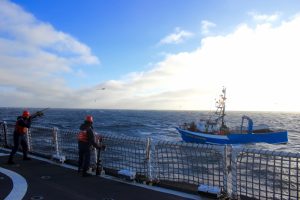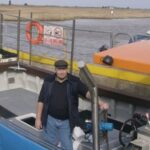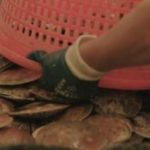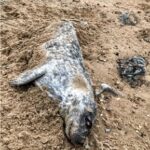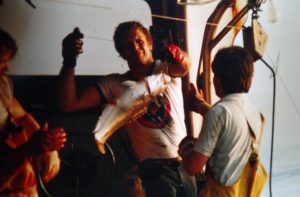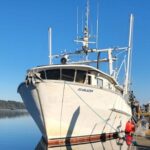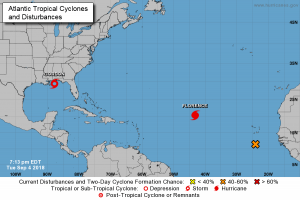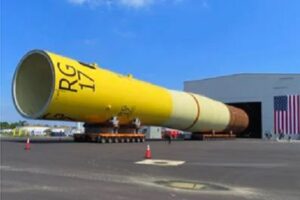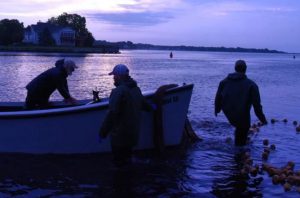 A fisherman was cleared of fishing without a licence after a judge ruled the authority which provides the licence was unclear. Jason Steele, of Lower Cabry, Quigley’s Point, was accused of fishing without a licence on Lough Swilly on September 21, 2015. He denied the charges before him at Carndonagh District Court. Fishery officer Seamus Bradley told the court he received a report of illegal oyster fishing on Lough Swilly so at 12.45pm on September 21 he launched the patrol boat from Rathmullan. Mr Bradley said himself and fishery officer James Doherty checked a number of boats for licences and undersized oysters. He explained how they boarded a boat fishing vessel, belonging to Mr Steele, which was fishing for oysters on Russell’s Bed. “I asked him if he had a licence to fish for native oysters on Lough Swilly, he replied no so I cautioned him. I observed 20-25kgs of oysters on board.” Mr Bradley said he seized the oysters and returned them to the oyster’s beds. He explained that Mr. Steele’s boat was 30 foot long with a large mechanical dredge on the back that is used for fishing for oysters. continue reading the story here 10:26
A fisherman was cleared of fishing without a licence after a judge ruled the authority which provides the licence was unclear. Jason Steele, of Lower Cabry, Quigley’s Point, was accused of fishing without a licence on Lough Swilly on September 21, 2015. He denied the charges before him at Carndonagh District Court. Fishery officer Seamus Bradley told the court he received a report of illegal oyster fishing on Lough Swilly so at 12.45pm on September 21 he launched the patrol boat from Rathmullan. Mr Bradley said himself and fishery officer James Doherty checked a number of boats for licences and undersized oysters. He explained how they boarded a boat fishing vessel, belonging to Mr Steele, which was fishing for oysters on Russell’s Bed. “I asked him if he had a licence to fish for native oysters on Lough Swilly, he replied no so I cautioned him. I observed 20-25kgs of oysters on board.” Mr Bradley said he seized the oysters and returned them to the oyster’s beds. He explained that Mr. Steele’s boat was 30 foot long with a large mechanical dredge on the back that is used for fishing for oysters. continue reading the story here 10:26
Monthly Archives: March 2017
Maritime Radar to Celebrate 70th Anniversary
 The first Type 1 radar system was produced and installed on a fishing trawler in 1947. It would become the first type-approved radar of any kind, earning a type-approval certificate in August 1948. Kelvin Hughes (www.kelvinhughes.com), a company with a 250-year history, is proud of having produced that navigation radar system and achieving a milestone in maritime history. The firm has developed radar systems for commercial ships, fishing vessels, coast-guard patrol vessels, and warships. continue reading the article here 12:32
The first Type 1 radar system was produced and installed on a fishing trawler in 1947. It would become the first type-approved radar of any kind, earning a type-approval certificate in August 1948. Kelvin Hughes (www.kelvinhughes.com), a company with a 250-year history, is proud of having produced that navigation radar system and achieving a milestone in maritime history. The firm has developed radar systems for commercial ships, fishing vessels, coast-guard patrol vessels, and warships. continue reading the article here 12:32
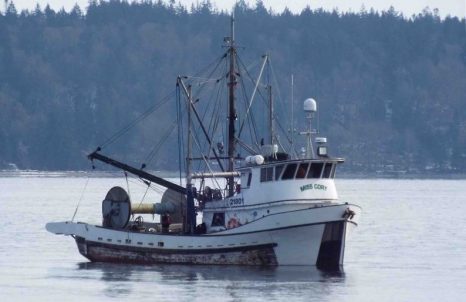
Fishing fatality prompts call for safer vessels, full investigation
The brother of the 51-year-old fisherman from Alert Bay who died when the Miss Cory capsized is calling for safety improvements to the industry. Mel Rocchio was in the engine room when the vessel took less than 15 seconds to capsize Monday afternoon after listing in calm waters near Comox, off Cape Lazo. It was the first day of the commercial seine roe-herring fishery in the Strait of Georgia. Four other crew members survived. Rocchio’s brother, Jim, also a veteran of the commercial fishing industry, said a 19.5-metre-long boat doesn’t sink that fast unless there are “catastrophic failures.” He said he wants to see a full investigation into his brother’s death. “If anything, we need to learn from this,” he said. “I really feel in my heart that no one else should have to go through this. Identify the problem and correct it so other people don’t lose a brother, or uncle or grandfather.” continue reading the story here 10:54
Department of Fisheries and Oceans considers making on-board cameras a must in N.S., P.E.I. tuna fishery
Canada’s DFO 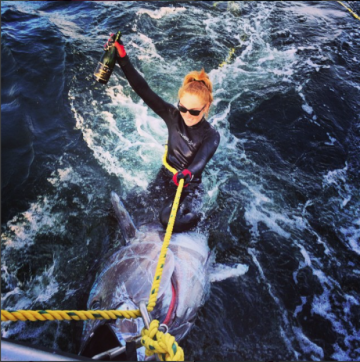 is considering making onboard surveillance cameras mandatory in the tuna fishery in northern Nova Scotia and Prince Edward Island. Next week DFO will release to industry its review of a two-year pilot project that saw cameras installed — starting in 2015 — for the first time in a commercial fishery in Atlantic Canada. The rear-facing cameras are aimed only at fishing activity. The department, which collects and reviews the data, says it may move to full implementation in the Gulf region for the commercial and charter boat catch-and-release bluefin tuna fishery in 2017. “This fishery has seen an increase in reports of non-compliance in recent years,” says a July 2016 briefing note prepared for the federal fisheries minister. More fallout from Operation Hook Up,,, continue reading the story here 10:17
is considering making onboard surveillance cameras mandatory in the tuna fishery in northern Nova Scotia and Prince Edward Island. Next week DFO will release to industry its review of a two-year pilot project that saw cameras installed — starting in 2015 — for the first time in a commercial fishery in Atlantic Canada. The rear-facing cameras are aimed only at fishing activity. The department, which collects and reviews the data, says it may move to full implementation in the Gulf region for the commercial and charter boat catch-and-release bluefin tuna fishery in 2017. “This fishery has seen an increase in reports of non-compliance in recent years,” says a July 2016 briefing note prepared for the federal fisheries minister. More fallout from Operation Hook Up,,, continue reading the story here 10:17
Oregon seeks compromise on Columbia salmon fishing reforms
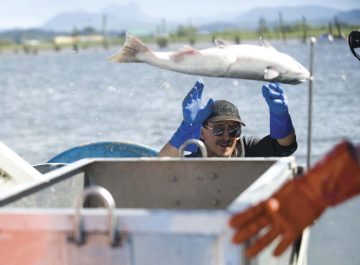 The chairman of the Oregon Fish and Wildlife Commission has offered to compromise with the Washington commission over their differences regarding the Columbia River salmon reforms. Earlier this year, the two state commissions approved reforms starting this year in how salmon are allocated between sport and commercial fishermen and allowable commercial fishing methods. Oregon opted for a plan more friendly to commercial fishing than did the Washington Fish and Wildlife Commission. Oregon Gov. Kate Brown then scolded the Oregon commission for reneging on a 2013 agreement to limit gillnetting to off-channel areas and told it to change the policy by April 3. Michael Finley, chair of the Oregon commission, sent a letter to Brad Smith, chair of the Washington commission, on Tuesday detailing his compromise proposals. By species, here is a look at Finley’s proposals: continue reading the story here 09:26
The chairman of the Oregon Fish and Wildlife Commission has offered to compromise with the Washington commission over their differences regarding the Columbia River salmon reforms. Earlier this year, the two state commissions approved reforms starting this year in how salmon are allocated between sport and commercial fishermen and allowable commercial fishing methods. Oregon opted for a plan more friendly to commercial fishing than did the Washington Fish and Wildlife Commission. Oregon Gov. Kate Brown then scolded the Oregon commission for reneging on a 2013 agreement to limit gillnetting to off-channel areas and told it to change the policy by April 3. Michael Finley, chair of the Oregon commission, sent a letter to Brad Smith, chair of the Washington commission, on Tuesday detailing his compromise proposals. By species, here is a look at Finley’s proposals: continue reading the story here 09:26
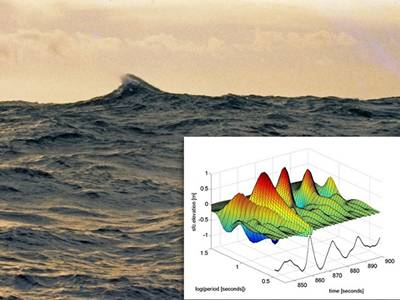
Massive Rogue Waves Aren’t Rare
University of Miami Rosenstiel School of Marine and Atmospheric Science scientist Mark Donelan and his Norwegian Meteorological Institute colleague captured new information about extreme waves, as one of the steepest ever recorded passed by the North Sea Ekofisk platforms in the early morning hours of Nov. 9 2007. Within the first hour of the day, the Andrea wave passed by a four-point square array of ocean sensors designed by the researchers to measure the wavelength, direction, amplitude and frequency of waves at the ocean surface. Using the information from the wave set—a total of 13,535 individual waves—collected by the system installed on a bridge between two offshore platforms, the researchers took the wave apart to examine how the components came together to produce such a steep wave. continue reading the article here 08:48
Trump asked to remove all marine monument fishing prohibitions established by the past two administrations
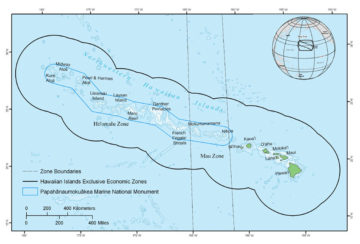 The request is from the chairman of the House Committee on Natural Resources, Congressman Rob Bishop, and American Samoa’s Congresswoman Aumua Amata. The letter says prohibitions on commercial fishing in marine monuments, or reserves, has impacted the US fishing fleet as well as forcing one cannery operation in Pago Pago to close. According to the two Republicans, closing US waters to domestic fisheries is federal overreach and obstructs well managed, sustainable US fishing industries in favour of foreign counterparts. The letter says over half of US waters in the Pacific have been closed to commercial fishing by a stroke of the pen without specific evidence, socioeconomic analysis, or a deliberative and public process. Link 08:10
The request is from the chairman of the House Committee on Natural Resources, Congressman Rob Bishop, and American Samoa’s Congresswoman Aumua Amata. The letter says prohibitions on commercial fishing in marine monuments, or reserves, has impacted the US fishing fleet as well as forcing one cannery operation in Pago Pago to close. According to the two Republicans, closing US waters to domestic fisheries is federal overreach and obstructs well managed, sustainable US fishing industries in favour of foreign counterparts. The letter says over half of US waters in the Pacific have been closed to commercial fishing by a stroke of the pen without specific evidence, socioeconomic analysis, or a deliberative and public process. Link 08:10
Man dies after pickup truck crashes into Cohasset Harbor
 COHASSET – The body of a 39-year-old lobsterman was recovered after a dive team pulled a pickup truck out of Cohasset Harbor Wednesday morning, police said. Police and fire officials received a report of a vehicle that was in the water off a dock near Lighthouse Lane and Border Street shortly before 5 a.m. Police Chief William Quigley identified the driver of the gray GMC truck as Keith Herzog, 39, of Cohasset, said. Several family members, local fishermen and townspeople stood watching in a nearby parking lot. Some people were seen hugging one another and crying. The Plymouth County Technical Rescue Team was called to respond to help locate the truck, which was about 50 feet from the dock and as deep as 18 feet down. Sadly, the rest of the story here 19:06
COHASSET – The body of a 39-year-old lobsterman was recovered after a dive team pulled a pickup truck out of Cohasset Harbor Wednesday morning, police said. Police and fire officials received a report of a vehicle that was in the water off a dock near Lighthouse Lane and Border Street shortly before 5 a.m. Police Chief William Quigley identified the driver of the gray GMC truck as Keith Herzog, 39, of Cohasset, said. Several family members, local fishermen and townspeople stood watching in a nearby parking lot. Some people were seen hugging one another and crying. The Plymouth County Technical Rescue Team was called to respond to help locate the truck, which was about 50 feet from the dock and as deep as 18 feet down. Sadly, the rest of the story here 19:06
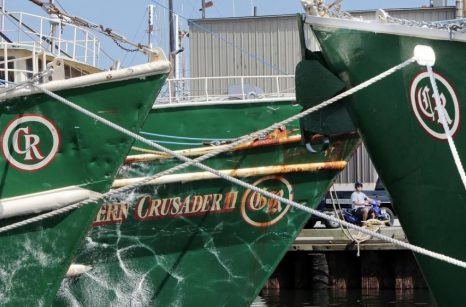
The Codfather will Cop a Plea!!! – Rafael scheduled to plead guilty to evading fish quotas, smuggling money
“The Codfather”, Carlos Rafael, who the Department of Justice labeled as the owner of the largest commercial fishing business in New England, will plead guilty to federal charges as part of a settlement he reached with the government, the U.S. Attorney’s office in Massachusetts said on Wednesday. Rafael, of Dartmouth, was scheduled to appear in federal court on March 20. Instead he’s scheduled to plead guilty to evading fishing quotas and smuggling profits to Portugal in U.S. District Court in Boston at 2 p.m. on March 16. The U.S. Attorney’s office provided no further details regarding the plea deal. Rafael’s attorney, William Kettlwell, did not return requests asking for comment. Read the rest here 17:06
Owner of largest commercial fishing business in New England, Carlos Seafood Inc., scheduled to plead guilty on evading fishing quotas for ‘bags of cash’ Click here to read this story 17:50
Celebrate the pragmatic elegance of gasoline marine engines
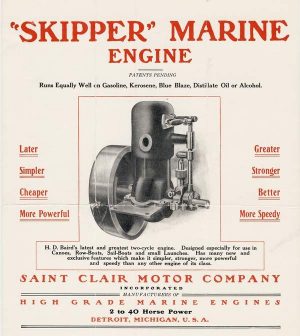 Gasoline marine engines revolutionized working life on the Columbia River estuary the way cotton gins did in the South, but they don’t get much respect. In the course of a half a tide, the river can go from mirror-like lake to something resembling a Michael Bay disaster movie. It’s a deceptive monster, one which generations of native and white fishermen were obliged to ride in little wooden boats. Until around 1900, the river’s sailing gillnet boats were at the whim of the wind, relying on canvas and oars to navigate the wild waters of the estuary and ocean plume in pursuit of salmon. Brave and courageous as they were, there wasn’t much they could do when a typhoon blew itself out on this fatal shore, driving boats onto the rocks like jellyfish drifted up on the beach. View five photo’s, and read the story here 15:24
Gasoline marine engines revolutionized working life on the Columbia River estuary the way cotton gins did in the South, but they don’t get much respect. In the course of a half a tide, the river can go from mirror-like lake to something resembling a Michael Bay disaster movie. It’s a deceptive monster, one which generations of native and white fishermen were obliged to ride in little wooden boats. Until around 1900, the river’s sailing gillnet boats were at the whim of the wind, relying on canvas and oars to navigate the wild waters of the estuary and ocean plume in pursuit of salmon. Brave and courageous as they were, there wasn’t much they could do when a typhoon blew itself out on this fatal shore, driving boats onto the rocks like jellyfish drifted up on the beach. View five photo’s, and read the story here 15:24
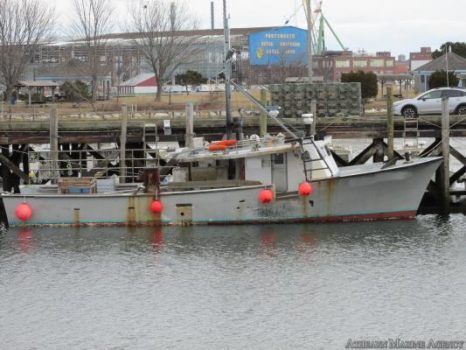
Athearn Marine Agency Boat of the Week: 65′ DMR Fiberglass Offshore Lobster boat, Cat 3408TA, JD 30 KW Generator
Specifications, information and 25 photo’s click here To see all the boats in this series, Click here 12:23 Federal Area 1 Permit, 800 +/- lobster traps with rope and buoys available
Search and Rescue crew describes dramatic rescue of five fishermen
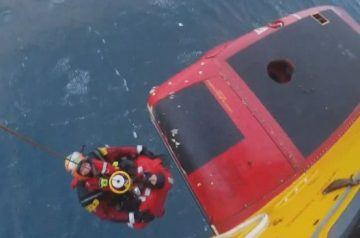 He was battered and sent flying by huge waves — and the first man to rappel down from a search and rescue helicopter northeast of St. John’s Sunday wondered how he was going to pull the mission off. Crew aboard the 103 Search and Rescue Squadron Cormorant helicopter managed to pull five sealers out of the Atlantic Ocean on Sunday, battling high waves and winds. “I would get smashed by the wave, and then the cable would go taunt, and I’d come flying out of it, all while trying to get close to the man that was in the water,” said Sgt. Damien Robison, the first technician to go over the side of the helicopter, trying to hoist up the five sealers. continue reading the story here 11:09
He was battered and sent flying by huge waves — and the first man to rappel down from a search and rescue helicopter northeast of St. John’s Sunday wondered how he was going to pull the mission off. Crew aboard the 103 Search and Rescue Squadron Cormorant helicopter managed to pull five sealers out of the Atlantic Ocean on Sunday, battling high waves and winds. “I would get smashed by the wave, and then the cable would go taunt, and I’d come flying out of it, all while trying to get close to the man that was in the water,” said Sgt. Damien Robison, the first technician to go over the side of the helicopter, trying to hoist up the five sealers. continue reading the story here 11:09
Judge gives fisherman ‘benefit of doubt’ in row over oyster dredges
Cod Found Once Again in Cold Ocean Waters off New York Harbor
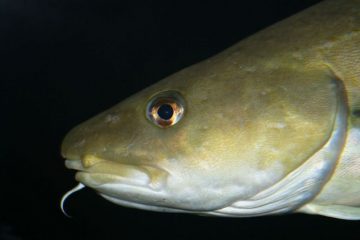 Over the last several years, one fish in particular has been making a slow, but steady comeback in the offshore environment of the northwestern North Atlantic. It was a fish that was so plentiful at one time that it filled the cold waters of New England’s rocky coastline, so much so that early Europeans named a large peninsula in Massachusetts after the fish. Cod, as declared by both the Boston Globe and the New Scientist, are making a comeback, after decades of strict government regulations. Last year, the Boston Globe wrote that the Canadian fishing authorities released a report in spring 2016 suggesting “cod are finally making a comeback….The report found that the adult population of northern cod had more than doubled in size over the past three years, and it estimates that the spawning stock will double again within the next three years — bringing it two-thirds of the way back to a healthy fishery.” It’s not just in New England and Canada either. Nearby recreational fisherman out of New York City and along Long Island to Montauk and down the Jersey Shore to Point Pleasant for the last several years have been finding more cod while angling out in the ocean during winter or early spring cod fishing trips. Read the article here 08:46
Over the last several years, one fish in particular has been making a slow, but steady comeback in the offshore environment of the northwestern North Atlantic. It was a fish that was so plentiful at one time that it filled the cold waters of New England’s rocky coastline, so much so that early Europeans named a large peninsula in Massachusetts after the fish. Cod, as declared by both the Boston Globe and the New Scientist, are making a comeback, after decades of strict government regulations. Last year, the Boston Globe wrote that the Canadian fishing authorities released a report in spring 2016 suggesting “cod are finally making a comeback….The report found that the adult population of northern cod had more than doubled in size over the past three years, and it estimates that the spawning stock will double again within the next three years — bringing it two-thirds of the way back to a healthy fishery.” It’s not just in New England and Canada either. Nearby recreational fisherman out of New York City and along Long Island to Montauk and down the Jersey Shore to Point Pleasant for the last several years have been finding more cod while angling out in the ocean during winter or early spring cod fishing trips. Read the article here 08:46
Updated: Man feared dead in B.C. capsizing identified as ‘loving husband, brother, uncle’
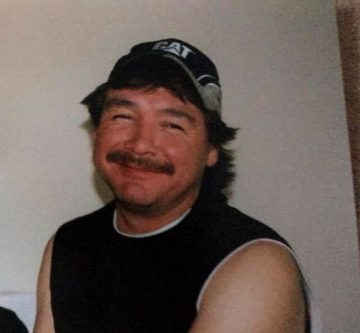 Investigators spent the day searching for answers after a herring boat flipped and capsized near Comox, while one crew member remained missing and was presumed drowned. Alert Bay resident Mel Rocchio, 51, was on the vessel “Miss Cory” fishing for herring near Cape Lazo, about three nautical miles northeast of Comox, with four other crew members. Just before 4 p.m. the boat flipped, tossing four crew members into the ocean while Rocchio was trapped in the engine room, according to his brother Jim. “They had a really big set. The boat was listing and Mel went down into the engine room to turn the pumps on, and while he was down there the boat rolled over,” he said. continue reading the story here 08:17 From another article – Rocchio had been fishing out of the Campbell River Fisherman’s Wharf for about 15 years, according to Phyllis Titus, manager of the Campbell River Harbour Authority. Some in the fishing industry would jokingly call him “Melfunction,” Titus said, but Rocchio was a jack of all trades: heavy equipment operator, mechanic, carpenter and hunter. “He was a fabulous man, one of the true gentlemen in the fishing industry,” she said. Read the story here 09:13
Investigators spent the day searching for answers after a herring boat flipped and capsized near Comox, while one crew member remained missing and was presumed drowned. Alert Bay resident Mel Rocchio, 51, was on the vessel “Miss Cory” fishing for herring near Cape Lazo, about three nautical miles northeast of Comox, with four other crew members. Just before 4 p.m. the boat flipped, tossing four crew members into the ocean while Rocchio was trapped in the engine room, according to his brother Jim. “They had a really big set. The boat was listing and Mel went down into the engine room to turn the pumps on, and while he was down there the boat rolled over,” he said. continue reading the story here 08:17 From another article – Rocchio had been fishing out of the Campbell River Fisherman’s Wharf for about 15 years, according to Phyllis Titus, manager of the Campbell River Harbour Authority. Some in the fishing industry would jokingly call him “Melfunction,” Titus said, but Rocchio was a jack of all trades: heavy equipment operator, mechanic, carpenter and hunter. “He was a fabulous man, one of the true gentlemen in the fishing industry,” she said. Read the story here 09:13
Out-of-state scallop boats threaten survival of Maine fishermen
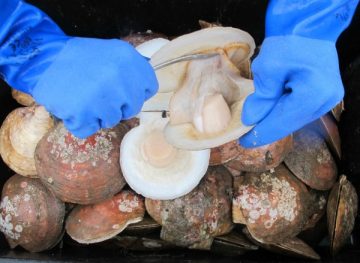 After years of waiting for the northern Gulf of Maine scallop population to flourish, small-boat fishermen from Maine say federal mismanagement of scallop stocks in the area could result in larger boats wiping them out. Hancock fisherman James West said that larger boats, most of which are based out of state, should not be allowed unlimited catches when he is capped at harvesting only 200 pounds of meat a day. And he said he’s angry that the New England Fishery Management Council has known about the regulatory disparity for years and has done nothing to address it. “That’s what makes me so mad about it,” West said Sunday. “I’m shocked the council couldn’t figure out a way to fix this. We’re really getting the shaft.” Council officials say protecting the lucrative resource is a high priority that they plan to address in the coming year. But Maine fishermen say a year could be too late to ensure that federal scallop grounds in the gulf stay productive. continue reading the story here 07:36
After years of waiting for the northern Gulf of Maine scallop population to flourish, small-boat fishermen from Maine say federal mismanagement of scallop stocks in the area could result in larger boats wiping them out. Hancock fisherman James West said that larger boats, most of which are based out of state, should not be allowed unlimited catches when he is capped at harvesting only 200 pounds of meat a day. And he said he’s angry that the New England Fishery Management Council has known about the regulatory disparity for years and has done nothing to address it. “That’s what makes me so mad about it,” West said Sunday. “I’m shocked the council couldn’t figure out a way to fix this. We’re really getting the shaft.” Council officials say protecting the lucrative resource is a high priority that they plan to address in the coming year. But Maine fishermen say a year could be too late to ensure that federal scallop grounds in the gulf stay productive. continue reading the story here 07:36
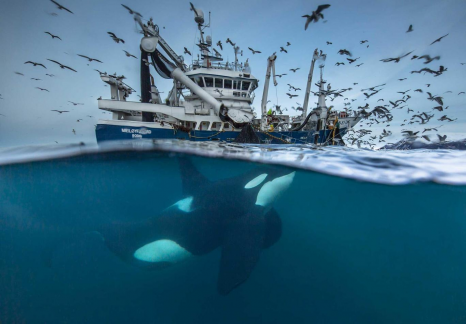
Photo of the Day: Splitting the Catch
Whales in some parts of the world have learned to follow the noise and activity of fishing boats in order to catch any herring near them. When the boats’ nets begin to close, the whales recognize what’s happening and take the opportunity to cut off any herring escaping the nets as they close. It’s sometimes a beneficial relationship for both the whales and the people fishing. Fishermen often locate killer whales and humpbacks to find the schools of herring that reside near them: Photographer Audun Rikardsen captured this photograph in the Arctic water off of Norway. His equipment includes the Canon EOS 5D Mark III with a 11-24mm f/4 lens at 11mm, 1/200 of a second, f/6.3, ISO 640. Read the rest here 21:29
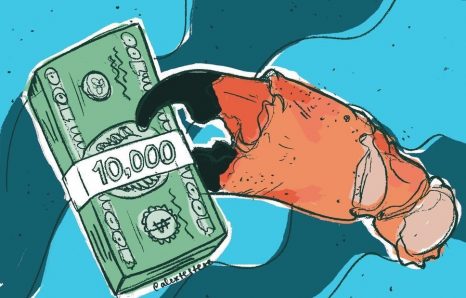
The Crab-Fishing Drug King of Everglades City
On a seafood pilgrimage to south Florida, Jamie Feldmar catches wind of drug-runners, false-bottom crab boats, and a tale so bizarre it could only be true. Maybe, Disclaimer: What I am about to tell you is all true…ish, though names have been changed to protect the guilty. I’ve fact-checked where possible, combing through newspaper archives to find evidence that supports the claims made within. But even now, months later, I still find myself questioning whether any of this was real, or if it was some kind of bizarro-world fever dream. So take everything in the account below with a grain of salt; treat it as my attempt to record a memory before it evaporates entirely. We’re en route to Everglades City because it is, according to the residents of Everglades City, the stone crab capital of the world. Dozens of crabbers are based there, supplying much of the country from October to May every year. read the story here 15:06
FISH-NL launches province-wide fundraising drive — Fish or cut bait
 FOR IMMEDIATE RELEASE, Tuesday, March 7th, 2017 -The Federation of Independent Sea Harvesters of Newfoundland and Labrador (FISH-NL) is today launching a major fundraising drive — Fish or cut bait — to support the break-away union’s certification application before the Labour Relations Board. “Fish or cut bait is an appeal to inshore harvesters — to the entire province — that if you want change in the fishery it’s time to step up and put your money where you mouth is,” says Ryan Cleary, President of FISH-NL. “We need all hands on deck.” Read the press release here 12:04:33
FOR IMMEDIATE RELEASE, Tuesday, March 7th, 2017 -The Federation of Independent Sea Harvesters of Newfoundland and Labrador (FISH-NL) is today launching a major fundraising drive — Fish or cut bait — to support the break-away union’s certification application before the Labour Relations Board. “Fish or cut bait is an appeal to inshore harvesters — to the entire province — that if you want change in the fishery it’s time to step up and put your money where you mouth is,” says Ryan Cleary, President of FISH-NL. “We need all hands on deck.” Read the press release here 12:04:33
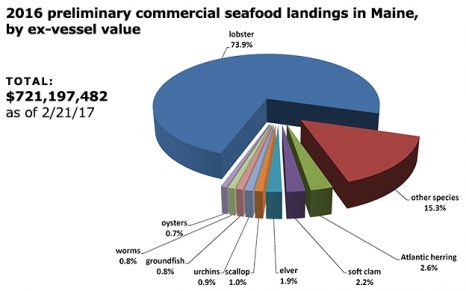
2016 proves a record year for Maine’s fishing industry
Maine’s fishing industry topped $700 million in overall value in 2016, including a dockside value for the lobster fishery of $533 million. Both were records, according to preliminary data released Friday by the Maine Department of Marine Resources. DMR reported the $721 million total value represented a nearly $100 million increase over 2015. For the second straight year, the largest single increase in value was in Maine’s lobster fishery. The fishery saw the overall landed value jump by more than $30 million — from $501 million in 2015 to $533 million in 2016 — while the average per pound value remained over $4 for the second year in a row, at $4.07. When factoring in bonuses paid to harvesters as reported by 14 of Maine’s 19 lobster co-ops, the overall landed value of Maine’s lobster fishery reached $547.24 million, DMR reported. continue reading the story here 11:09
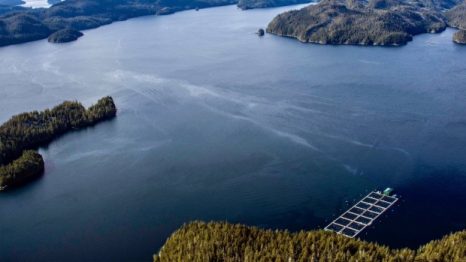
Oily sheen from B.C. fish farm diesel spill can’t be recovered: officials
An oily rainbow-like sheen on the water left by a diesel fuel spill off the north coast of Vancouver Island cannot be cleaned up, sparking concerns for a nearby First Nation that relies on clam digging for food and economic security. The thin layer of fuel, which covered a 5.5-kilometre radius at one point outside the salmon farm where the spill originated, has been deemed unrecoverable because it cannot be captured by skimmer vessels or sorbent materials, British Columbia’s Environment Ministry said. Fuel has made contact with some shorelines in the Burdwood Island group, a sensitive area teeming with clam beds that the Kwikwasut’inuxw Haxwa’mis First Nation says are crucial to its economy. continue reading the story here 10:24
The man who $old Alaska
 On March 29, 1867, literally in the middle of the night, diplomats hammered out a deal that transferred the Russian Empire’s claims in the New World to the United States for $7.2 million. One-hundred-fifty years later, Alaska knows the name of Secretary of State William H. Seward, the American who negotiated the purchase of Alaska. His name is on a city, a highway, a peninsula and more. But what of the man on the other side of the table, Alexander II, autocrat and tsar of Russia? Who was he? It depends on whom you ask. In Finland and Bulgaria he is considered “The Liberator.” In Poland and the Caucasus he is remembered as “The Exterminator.” He ruthlessly suppressed dissent and pursued foreign wars, even while cowering in the face of terrorism at home. He also brought sweeping reforms to Russia, most famously emancipating the serfs five years before slavery was banned in the United States. Alaska was just one small page in his career. continue reading the article here 09:29
On March 29, 1867, literally in the middle of the night, diplomats hammered out a deal that transferred the Russian Empire’s claims in the New World to the United States for $7.2 million. One-hundred-fifty years later, Alaska knows the name of Secretary of State William H. Seward, the American who negotiated the purchase of Alaska. His name is on a city, a highway, a peninsula and more. But what of the man on the other side of the table, Alexander II, autocrat and tsar of Russia? Who was he? It depends on whom you ask. In Finland and Bulgaria he is considered “The Liberator.” In Poland and the Caucasus he is remembered as “The Exterminator.” He ruthlessly suppressed dissent and pursued foreign wars, even while cowering in the face of terrorism at home. He also brought sweeping reforms to Russia, most famously emancipating the serfs five years before slavery was banned in the United States. Alaska was just one small page in his career. continue reading the article here 09:29
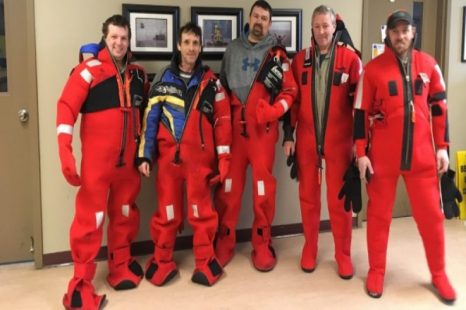
Rescued crew headed back to sea to retrieve vessel
Some members of the crew of the Northern Provider who were rescued Sunday morning are headed back to sea today to bring home their boat. The five sealers, who had left Carmanville in the vessel Feb. 27, ran into some dangerous stormy weather and were forced to call for help at about 150 nautical miles outside St. John’s. On Sunday, the Joint Rescue Coordination Centre in Halifax released a video of the dramatic rescue, which saw the men forced to jump into the freezing water one by one before being hoisted up into a helicopter. Cormorant and Hercules helicopters and two Coast Guard vessels attended the rescue. None of the sealers, who are from Summerford, New World Island, were seriously injured. link 08:49
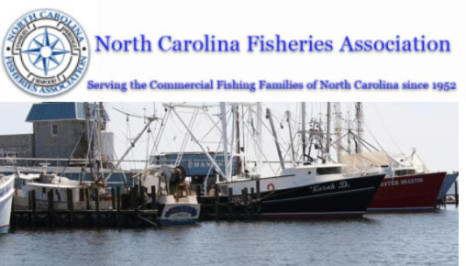
North Carolina Fisheries Association Weekly Update for March 6, 2017
Click here to read the Weekly Update, to read all the updates, Click here 08:36
Grundens Rain Gear Review: Herkules Bib Pants and Ragnar Jacket
 The Grundens Herkules Bib Pants and Ragnar Jacket are designed to keep the wind and water from interfering with sport, commercial, and onshore fishing activities. As the company’s story goes, around a century ago a Swede named Carl Grundén, the son of a fisherman, began to manufacture water-repellent garments to withstand the forces of nature. Grundens rain gear might be a bit of an unconventional review for these pages since it’s unlike other products we review and we’re not going out on the water, but that doesn’t mean we can’t find a use for what, at least at first blush, seem to be some very fine products. Considering how well-respected the brand is in commercial fishing, we expect it to be just as good on the jobsite. And if all else fails then, hey – we’ll go fishing! continue reading the article here 07:53
The Grundens Herkules Bib Pants and Ragnar Jacket are designed to keep the wind and water from interfering with sport, commercial, and onshore fishing activities. As the company’s story goes, around a century ago a Swede named Carl Grundén, the son of a fisherman, began to manufacture water-repellent garments to withstand the forces of nature. Grundens rain gear might be a bit of an unconventional review for these pages since it’s unlike other products we review and we’re not going out on the water, but that doesn’t mean we can’t find a use for what, at least at first blush, seem to be some very fine products. Considering how well-respected the brand is in commercial fishing, we expect it to be just as good on the jobsite. And if all else fails then, hey – we’ll go fishing! continue reading the article here 07:53

Seine roe-herring fishery opens with sinking of vessel, one crew member missing
STRAIT OF GEORGIA — The commercial seine roe-herring fishery opened Monday to disaster with the sinking of the vessel, Miss Cory, and a search underway for a missing crew member. Dan Bate, spokesman for Fisheries and Oceans Canada, said Marine Communications and Traffic Services in Victoria at 4 p.m. overheard a report that a fishing vessel had capsized off Cape Lazo near Comox on Vancouver Island. Four persons were recovered by another fishing vessel. The fifth crew member missing had been in the engine room during the capsizing and sinking in deep water, he said. The Canadian Coast Guard in Powell River and French Creek, near Parksville, are being enlisted in the search, along with a Canadian Forces Cormorant and search-and-rescue volunteers in Comox. continue reading the story here 23:58
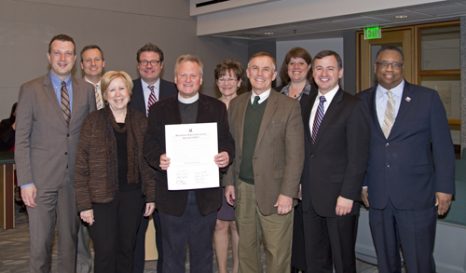
“Blessing of the Fleet” – County Council joins in wishing “safe fishing” to crews preparing to head to Alaska
Washington is known for having some of the best seafood in the world, much brought to our shores from crews preparing to go to Alaska for the summer fishing season. The Metropolitan King County Council today recognized those brave men and women who will spend their summer in the North Pacific by recognizing the “Blessing of the Fleet” which will occur this weekend, the start of the halibut fishing season. “Commercial fishing has been a foundation of our economy for over a century. Fishers risk their lives, and their families risk the loss of their loved ones every year. The fishing industry is an integral part of our King County community,” said Councilmember Jeanne Kohl-Welles, the sponsor of the recognition. “We also acknowledge the many years of participation by the Ballard First Lutheran Church in the annual Blessing of the Fleet. We wish the fleet an abundant and abundantly healthy start of the season!” continue reading the story here 21:40






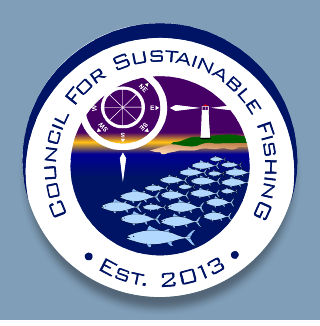
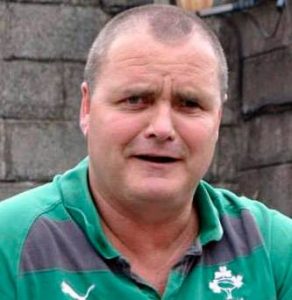 Pat O’Mahony and Leonard Hyde had insisted to Cork District Court they understood the UK agency they hired would ensure full compliance with all Irish visa, work permit and passport regulations. Both also vehemently insisted that the two Filipino fishermen involved were treated with every consideration and respect while they worked on the ‘Labardie Fisher’ trawler operating from Crosshaven, Co Cork in 2015. The men told the two day trial that, had they any inkling the two Filipino sailors were not legally entitled to work in Ireland because they had entered via Belfast, they would never have contracted for them. Judge Aingeal Ni Chonduin dismissed all charges against the men after the trial heard that other fishermen who used the same agency and route to bring Filipino sailors into Ireland to work on other trawlers had those workers even given safety training by State agencies. Cork District Court was packed with up to 30 fishermen from all over Cork, Kerry, Waterford and Donegal who wanted to support the duo. All cheered as Judge Ni Chonduin dismissed all charges within minutes of the closing arguments.
Pat O’Mahony and Leonard Hyde had insisted to Cork District Court they understood the UK agency they hired would ensure full compliance with all Irish visa, work permit and passport regulations. Both also vehemently insisted that the two Filipino fishermen involved were treated with every consideration and respect while they worked on the ‘Labardie Fisher’ trawler operating from Crosshaven, Co Cork in 2015. The men told the two day trial that, had they any inkling the two Filipino sailors were not legally entitled to work in Ireland because they had entered via Belfast, they would never have contracted for them. Judge Aingeal Ni Chonduin dismissed all charges against the men after the trial heard that other fishermen who used the same agency and route to bring Filipino sailors into Ireland to work on other trawlers had those workers even given safety training by State agencies. Cork District Court was packed with up to 30 fishermen from all over Cork, Kerry, Waterford and Donegal who wanted to support the duo. All cheered as Judge Ni Chonduin dismissed all charges within minutes of the closing arguments. 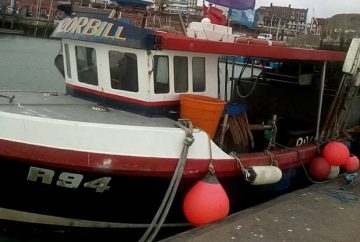 A Ramsgate fisherman has hit out at an EU policy that he claims is causing him to lose up to £50,000 worth of fish a year. Steve Barratt of Thanet Fishermen’s Association is calling on the UK to take back control of its territorial waters as part of the Brexit negotiations and abandon the Common Fisheries Policy (CFP). He called the policy “immoral” and harmful to fish stocks. The commercial fisherman from Ramsgate, who operates an under 10 metre boat, is among a dozen other local fishermen who lose money because they have to discard dead fish. The 58-year-old grandfather said: “Firstly, we want to immediately scrap the current rules and regulations and the CFP that have not and will not work. “Secondly, we want to ban the practise of discarding dead fish and make it law that they are landed and recorded. “This will benefit scientists as they will have accurate information to work with, and will obviously benefit the fishermen that caught these fish due to the value of these fish.” He added: “Thirdly, we are proposing a system whereby we are limited in the number of days we can go to sea and we are proposing that we are limited in the amount of gear we can use.
A Ramsgate fisherman has hit out at an EU policy that he claims is causing him to lose up to £50,000 worth of fish a year. Steve Barratt of Thanet Fishermen’s Association is calling on the UK to take back control of its territorial waters as part of the Brexit negotiations and abandon the Common Fisheries Policy (CFP). He called the policy “immoral” and harmful to fish stocks. The commercial fisherman from Ramsgate, who operates an under 10 metre boat, is among a dozen other local fishermen who lose money because they have to discard dead fish. The 58-year-old grandfather said: “Firstly, we want to immediately scrap the current rules and regulations and the CFP that have not and will not work. “Secondly, we want to ban the practise of discarding dead fish and make it law that they are landed and recorded. “This will benefit scientists as they will have accurate information to work with, and will obviously benefit the fishermen that caught these fish due to the value of these fish.” He added: “Thirdly, we are proposing a system whereby we are limited in the number of days we can go to sea and we are proposing that we are limited in the amount of gear we can use. 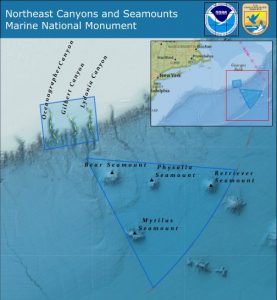 A coalition of New England fishermen organizations filed suit today over former President Barack Obama’s designation of a vast area of ocean as a national monument — a dictate that could sink commercial fishing in New England. The organizations filing the lawsuit are the Massachusetts Lobstermen’s Association, Atlantic Offshore Lobstermen’s Association, Long Island Commercial Fishing Association, Rhode Island Fisherman’s Alliance, and Garden State Seafood Association. They are represented, free of charge, by Pacific Legal Foundation, a watchdog organization that litigates nationwide for limited government, property rights, and a balanced approach to environmental regulations. The lawsuit challenges President Obama’s September 15, 2016, creation of the Northeast Canyons and Seamounts Marine National Monument, 130 miles off the coast of Cape Cod.
A coalition of New England fishermen organizations filed suit today over former President Barack Obama’s designation of a vast area of ocean as a national monument — a dictate that could sink commercial fishing in New England. The organizations filing the lawsuit are the Massachusetts Lobstermen’s Association, Atlantic Offshore Lobstermen’s Association, Long Island Commercial Fishing Association, Rhode Island Fisherman’s Alliance, and Garden State Seafood Association. They are represented, free of charge, by Pacific Legal Foundation, a watchdog organization that litigates nationwide for limited government, property rights, and a balanced approach to environmental regulations. The lawsuit challenges President Obama’s September 15, 2016, creation of the Northeast Canyons and Seamounts Marine National Monument, 130 miles off the coast of Cape Cod. 



























